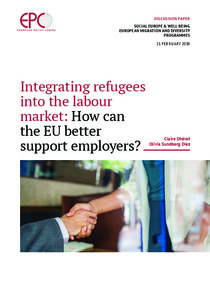Integrating refugees into the labour market: How can the EU better support employers?
"The integration of refugees carries enormous benefits, and one of the surest ways to help refugees feel welcomed and valued in their host countries – and for the host society to welcome and accept them in return - is through employment. Employers, then, play a pivotal role in bridging the gap...
| Main Authors: | , |
|---|---|
| Institution: | ETUI-European Trade Union Institute |
| Format: | TEXT |
| Language: | English |
| Published: |
Brussels
2019
EPC |
| Subjects: | |
| Online Access: | https://www.labourline.org/KENTIKA-19306434124911246169-integrating-refugees-into-the-.htm |
| Summary: | "The integration of refugees carries enormous benefits, and one of the surest ways to help refugees feel welcomed and valued in their host countries – and for the host society to welcome and accept them in return - is through employment. Employers, then, play a pivotal role in bridging the gap between the initial reception of refugees and their sustainable inclusion into the host society.
However, according to the European employers who participated in an EPC questionnaire on this subject, the barriers to hiring refugees remain high: there’s the complicated process of qualification recognition, the various legal restrictions on working during the asylum-seeking procedure, and inadequate and uncoordinated support from local, regional and national public authorities.
That is why, in this Discussion Paper, Claire Dhéret and Olivia Sundberg Diez make a case for the EU to step in as the interface between national authorities and employers and create an enabling environment for integration policies to be developed, implemented and assessed at the local level. It can do this by harmonising the patchwork of different approaches across the Union, offering policy guidance to national authorities and leverage financial support.
By proving that it can contribute to the long-term integration of refugees and that host societies can thrive through the inclusion of newcomers, the EU can also offer a credible counter-narrative to anti-migration forces. Even though the current political mood in national capitals is clearly not conducive to expanding EU competencies in the area of integration policies, the importance of the issue and its possible collateral effects on EU migration policies, the Common European Asylum System, and, in general, the future of Europe, leaves the EU with no choice but to act." |
|---|---|
| Physical Description: | 11 p. Digital |

